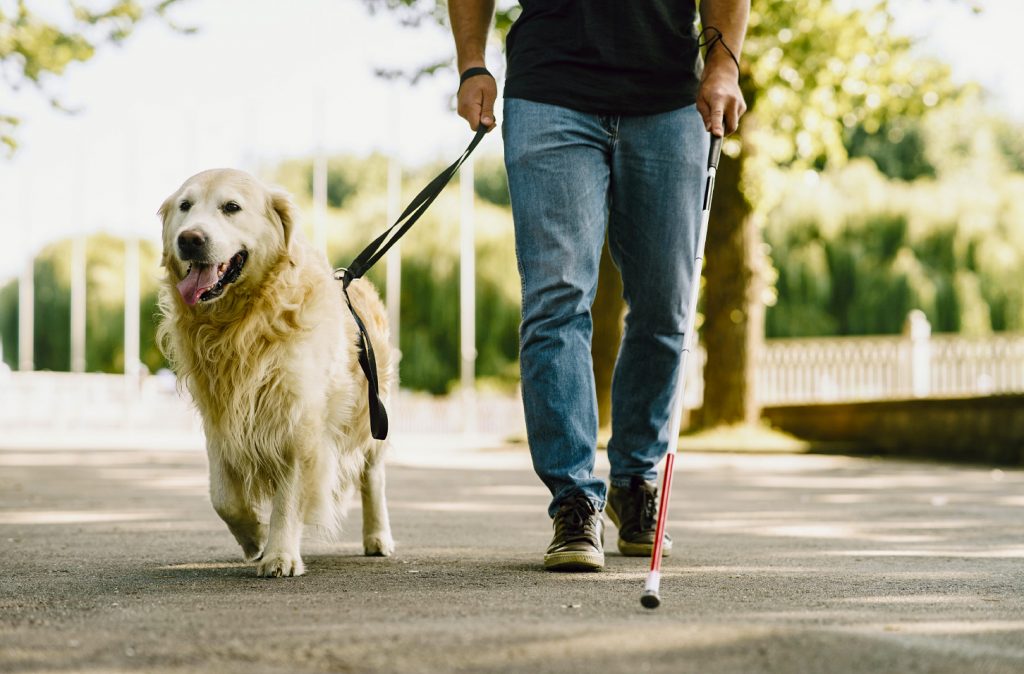
Service animals are protected under the Americans with Disabilities Act (ADA), which ensures equal access and reasonable accommodation for individuals with disabilities in public places, including places of worship.
As a general principle, service animals are permitted in public places such as restaurants, stores, and hotels as service animals are exempt from locations with no-pets policies. In some instances, a service animal may be excluded if it is not under control, poses a direct threat to the health or safety of others, or is not housebroken. However, such exclusions are rare and should be based on the animal’s behavior rather than the fact that it is a service animal.
Service Animal:
According to the ADA, a service animal is generally defined as a dog (and sometimes a miniature horse) that is individually trained to perform tasks or work for a person with a disability. Depending on the type of tasks they’re trained to do, service animals undergo complex and specific training. The work or tasks performed by a service animal must be directly related to the handler´s disability. Upon completion of training, the animals are then granted “public access,” which is defined by the ADA as:
State and local governments, businesses and nonprofit organizations that serve the public generally must allow service animals to accompany people with disabilities in all areas of the facility where the public is normally allowed to go.
However, the ADA doesn’t require service dogs to be professionally trained, which can cost thousands of dollars. Individuals living with disabilities may train a service dog themselves. The ADA doesn’t require service animals to wear vests or any other form of identification.
In general, the animal must be:
- Trained to perform specific tasks that directly relate to the person’s disability. The tasks can be related to physical disabilities, sensory impairments, psychiatric conditions, or other mental health issues.
- Trained to perform specific tasks that mitigate the person’s disability. These tasks must be directly related to the person’s disability, rather than providing emotional support alone.
- Closely bonded with its handler, who is the person with a disability. The handler relies on the animal’s trained tasks to help with their disability-related limitations.
Emotional Support Animals:
It’s essential to note that emotional support animals (ESAs) and therapy animals are different from service animals. Emotional support animals provide comfort and emotional support to individuals with mental health conditions but are not trained to perform specific tasks. Therapy animals are typically trained to provide comfort to multiple people in therapeutic settings, such as hospitals or nursing homes, but do not have the same public access rights as service animals.
To be afforded protection under federal law, a person must meet the federal definition of disability and must have a note from a doctor—not a family doctor, but a therapist stating that the person has an emotional or mental disability and that the emotional support animal provides a benefit for the individual with the disability. An animal doesn’t need specific training to be an emotional support animal, and more than one tenant has tested the boundaries of what’s allowable.
Therapy Dogs:
As opposed to service dogs, which are trained to care for a single person, a therapy dog is a canine trained to interact with various people, providing affection and comfort to people in hospitals, retirement homes, nursing homes, schools, hospices, disaster areas, and to people with autism. Therapy dogs aren’t considered to be service dogs, because the dog would need to be individually trained to assist a specific individual’s disability. Therapy dogs have a handler who brings the animal to multiple locations to provide therapeutic benefits to others, but the handler doesn’t have a disability for which the dog was trained to assist.
Note:
The presence of service animals in places of worship should not be seen as a disruption or violation of religious practices. On the contrary, allowing service animals to assist individuals with disabilities in attending religious services is in line with the principles of inclusion and equal access.
It’s important to note that while service animals have broad access rights, emotional support animals and therapy animals do not enjoy the same level of public access.
Please see our other related articles
ADA
Church Officer and Director Liability
HIPAA
Disclaimer: Every situation is different and particular facts may vary thereby changing or altering a possible course of action or conclusion. The information contained herein is intended to be general in nature as laws vary between federal, state, counties, and municipalities and therefore may not apply to any given matter. This information is not intended to be legal advice or relied upon as a legal opinion, course of action, accounting, tax, or other professional services. You should consult the proper legal or professional advisor knowledgeable in the area that pertains to your particular situation.
